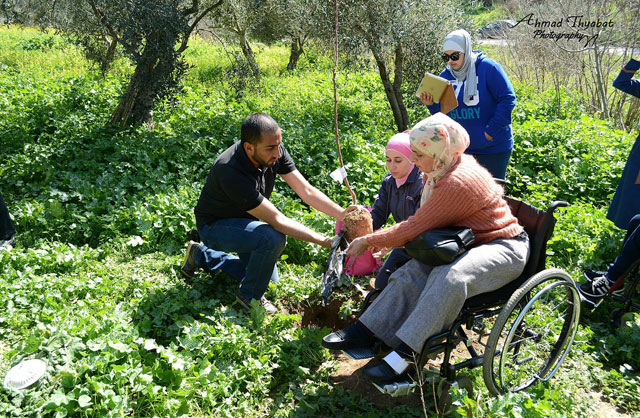AMMAN — Until recently, Hadeel Abu Soufeh was not able to fully express her love of nature by working on the land.
Confined to a wheelchair, her disability hindered her from planting trees, which she feels is an activity that symbolises the acts of giving and belonging to the land.
But thanks to the Green Caravan project by the Arab Group for the Protection of Nature and the Masar Initiative, Abu Soufeh recently took part in a tree planting activity in Irbid, some 80km north of Amman.
“It was a first for people with disabilities and those without disabilities to volunteer to plant trees hand in hand,” Abu Soufeh told The Jordan Times in a recent phone interview.
The group planted trees on the land of an underprivileged family to help them secure financial independence, she added.
Abu Soufeh, who is an activist for the rights of people with disabilities, planted three trees assisted by volunteers who helped dig holes and carry the saplings.
“The activity sends an indirect message that people with physical disabilities are able to volunteer and boost the country’s development if given the opportunity and the right facilities,” she said.
The advocate was one of three people in wheelchairs. Two volunteers who walk with crutches and a visually impaired volunteer also took part, along with 50 able-bodied people.
Gardinia Izzedin, a teacher for children with disabilities and an active volunteer in the field, said such activities are essential to allow disabled people to give back to their communities.
As an able-bodied volunteer, Izzedin said such activities also spread awareness among people without disabilities on how to interact respectfully with disabled people.
She highlighted that many able-bodied people do not know how to push wheelchairs safely, or that they should be one step ahead when escorting visually impaired people in order to guide them safely.
The tree planting took place in the Rayyan area of Irbid on a land belonging to two underprivileged farmers who had been unable to cultivate it, said Mohammad Qteishat, the project manager at the Arab Group for the Protection of Nature.
Volunteers planted 200 fruit trees, Qteishat told The Jordan Times.
He cited the Green Caravan programme as a way to expand vegetation in Jordan and to enhance food security, adding that the programme also strengthens people’s capacity to sustain the region’s natural resources, a central aim of the group.
Since the non-profit organisation was established in 2003, around 50,000 trees have been planted, with an emphasis over the past four years on planting fruit trees that can support the livelihoods of inhabitants of remote or underdeveloped areas.
The group’s voluntary tree planting activities target school and university students as well as company employees, said Qteishat, citing the recent inclusion of people with disabilities to expand social inclusion.
The process involves visiting the location ahead of planting to make sure it is suitable, as well as digging the holes for the trees, he said, citing some challenges in finding a wheelchair-accessible bus.
Qteishat said the group seeks to carry out sustainable tree planting activities that incorporate disabled people in rainy seasons between mid-October and late April, which is the most suitable time for tree planting.
Izzedin said she would not hesitate to volunteer again.
“I would love to go visit the trees I planted a few years from now and see how they have grown.”
